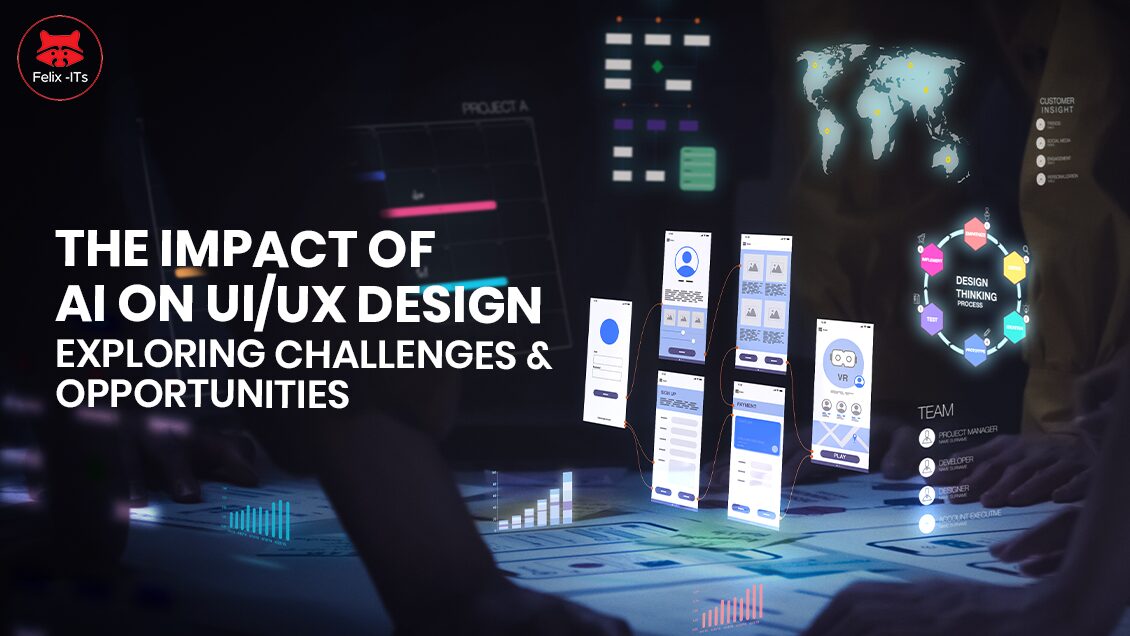In the last two decades, the UI/UX design world has seen a lot of new advancements with a couple of breakthroughs as well. However, the most impactful and recent one is the integration of Artificial Intelligence (AI). It is safe to say that AI can transform everything including how we know UI/UX design for now.
In this article by Felix-IT Systems, we will explore the impact of AI in UI/UX design along with the challenges and opportunities!
AI-Driven Design: More than Just Automation
AI in UI/UX design is beyond automation as it boosts creativity and innovation. AI tools analyze vast data, revealing insights human designers might miss. This leads to more informed, user-focused design decisions. By handling repetitive tasks, AI frees designers to concentrate on creativity. It offers data-driven inspiration, sparking new ideas. The real power of AI is its synergy with human creativity. Together, they craft designs that resonate deeply with users. This partnership enables more innovative and user-friendly designs, pushing the boundaries of what’s possible.
Personalization at Scale
AI greatly impacts UI/UX by enabling large-scale personalization. AI algorithms process real-time data to adapt interfaces and interactions based on user behavior, preferences, and emotions. This level of personalization makes digital experiences more intuitive and engaging. Users get interfaces tailored to their needs, enhancing satisfaction and usability. AI transforms digital interactions by understanding each user. Making experiences more personalized and enjoyable. This personalization possibility allows the designers to create more user-friendly and responsive designs.
Bonus Read – Level Up Your UI/UX Skills: AI-Focused Online Courses for Designers
The Challenge of Ethical Design
It is true that with great power comes great responsibility even for AI in UI/UX design. The ethical point has always been a hot topic since the widespread use of AI in diverse industries. As AI is becoming a staple in the design world, ethical considerations are a must. Designers must address concerns about data privacy, user consent, and the transparency of AI-driven decisions. Ensuring that AI enhances user autonomy without manipulating behavior is crucial for ethical design practices. Because just like every other technological breakthrough, it is a must that we utilize it for the betterment of humanity.
Threats in Harnessing AI for UX Design
Though AI bears such immense promise for the enhancement of UX design, it also poses daunting struggles that designers must pick their way through carefully.
- Bias in AI Algorithms: Given that AI systems work with data sets, AI algorithms may sustain unwanted biases in the data sets, thus ensuring unfair or discriminatory user experiences, which designers must actively combat.
- Less Human Element: Incorporation of AI may lead to further reduction of human connection, providing less personalized experiences and potentially deterring users who value human connection in the design.
- Threat to Data Privacy: Since AI systems typically have access to user data, data privacy is again a subject of concern, as such data can be misused.
- Implementation Complexity: Understanding and executing AI technologies can be complex and may pose quite a challenge for designers, who may not have technical knowledge about AI.
- Trust Issues: Users can be doubtful about AI-based interfaces out of concern that their interactions might be manipulated, or their data will not be secure, hence hindering adoption.
- Unpredictable User Behavior: It is very difficult to anticipate user functions for AI features since they can react in unpredictable ways, which can influence satisfaction and engagement.
- Skill Gap: The rapid emergence of AI technologies is another element contributing to the skill gap, as designers are finding themselves unable to keep up with the new tools and methodologies that would allow them to integrate AI successfully.
Enhancing User Accessibility
AI greatly enhances accessibility in design. It enables features like predictive text, voice recognition, and personalized content adjustments. These features make digital products more accessible to people with disabilities. AI tailors experience to users’ abilities, broadening the user base.
By improving accessibility, AI ensures that more people can effectively use digital products. This leads to a more inclusive and user-friendly digital environment. Overall, AI is a game-changer, making technology accessible to everyone, regardless of their abilities.
Additional Read – How to Successfully Land a UX/UI Design Internship in 2025
The Future is Collaborative: AI and Human Designers
AI can handle data-heavy tasks, provide analytical insights, and even suggest design modifications. This can save a massive amount of time and effort for the designers so they may focus more on creative and strategic aspects of product development. By working together, AI and designers can produce more innovative solutions and speed up the design process. Combining the best of both analytical precision and human creativity.
Preparing for an AI-Driven Industry
For current and aspiring designers, understanding and adapting to AI tools is becoming non-negotiable. Using AI in design requires not just technical knowledge but also an understanding of human psychology and behavior. This ensures AI solutions meet user needs effectively.
Final Thoughts
AI is not just a trend in UI/UX design—it is reshaping the digital world of design. As we continue to explore the possibilities of AI in design, it’s important for professionals to stay updated with the in-demand skills. Especially those working in the vibrant industry of Pune to leverage AI for creative and innovative solutions. Learning AI will not only improve your UI/UX design skills but also ensure you remain at the forefront of the industry.
For those eager to dive deeper into AI in UI/UX, consider exploring specialized courses that focus on integrating AI with design principles. Felix-IT Systems is one of the best institutes offering a comprehensive UI/UX design course in Pune. The comprehensive course, expert faculties, and placement support make it a perfect place to study UI/UX design!


